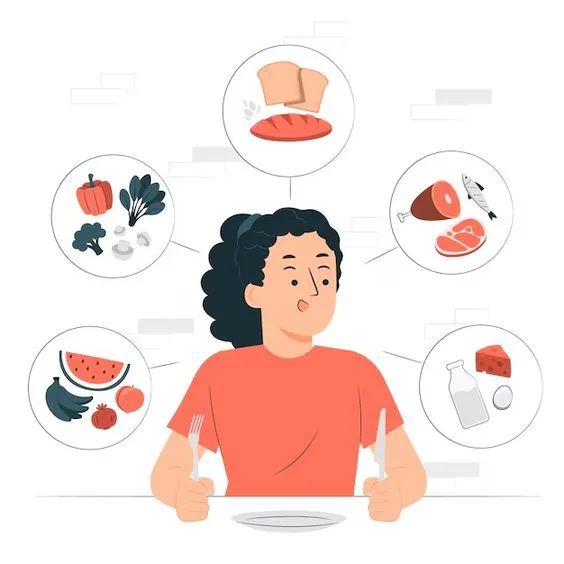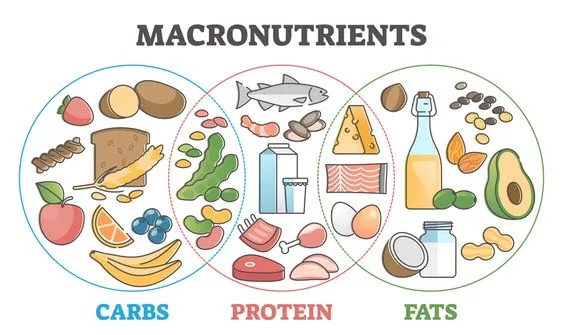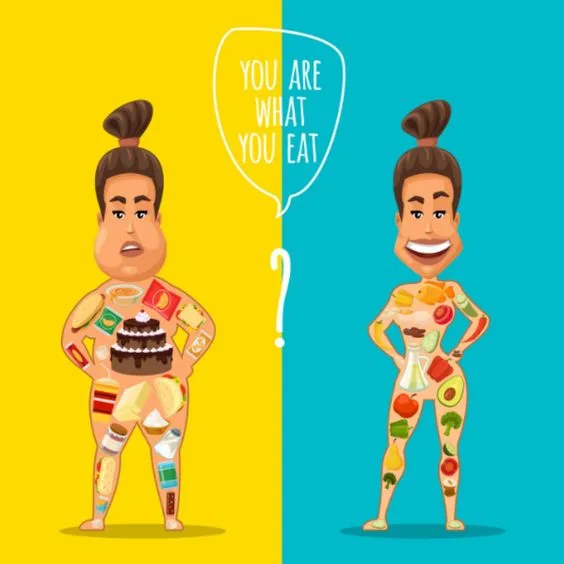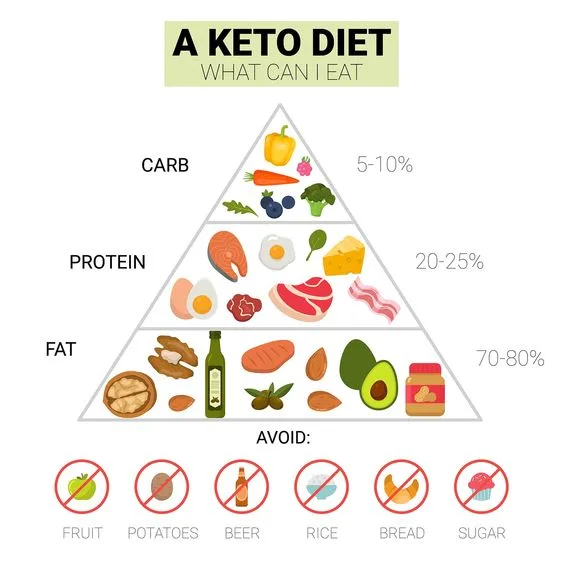Keto Diet: Burn Fat & Feel Great -The Beginner’s Guide in 2024

The keto diet has taken the world by storm, promising weight loss, improved health, and a surge of energy. What are the details of this, and would it be a good fit for you?
This comprehensive guide will unveil the mysteries of keto, from its fascinating history to the science behind its magic. We’ll delve into the benefits and drawbacks, explore delicious keto-friendly foods, and equip you with the knowledge to embark on your own keto journey.
A Trip Through Time: The History of Keto diet
The ketogenic diet (keto for short) isn’t a fad; it’s been around for over a century. Originally developed in the 1920s to treat epilepsy, keto has since evolved into a popular weight-loss approach.
The Science of Ketosis: Flipping the Metabolic Switch
Our bodies naturally burn glucose (sugar) from carbohydrates for energy. However, when we drastically reduce carbs on keto, our bodies enter a metabolic state called ketosis. In this state, the liver starts producing ketones, an alternative energy source derived from fat. This fat-burning process is the heart of keto’s effectiveness.
Understanding the Hows and Whys: How the Keto Diet Works

Keto success hinges on macronutrients – the building blocks of our diet. Keto diet focuses on:
- High Fat: Think fatty fish, avocados, nuts, and healthy oils. These provide most of your daily calories.
- Moderate Protein: Lean meats, poultry, eggs, and some plant-based options ensure your body has the building blocks it needs.
- Very Low Carb: Sugary drinks, grains, starchy vegetables, and most fruits become off-limits.
The Carb Conundrum: The Role of Carbohydrates
Carbohydrates are often demonized on keto, but they play a vital role in our bodies. However, by restricting them, we force our bodies to adapt and utilize fat for fuel, leading to weight loss and potential health benefits.
Demystifying Ketosis: What it Means to be “In Keto”
Reaching ketosis typically takes 3-4 days on a very low-carb keto diet. Some people experience symptoms like fatigue and headaches initially, known as the keto flu. Don’t worry, these usually pass quickly. You can monitor ketosis with urine test strips or a breathalyzer-like device.

The Macronutrient Breakdown: How Much of What to Eat
A typical keto diet breaks down macronutrients as follows:
- 70-80% Fat: This is your primary energy source.
- 20-25% Protein: Ensures your body repairs and rebuilds tissues.
- 5-10% Carbs: Comes from low-carb vegetables and a small amount of fruit.

Unlocking the Benefits: Why People Choose Keto diet
The keto diet has some possible advantages, like..
- Weight Loss: By burning fat for fuel, keto can lead to significant weight loss.
- Improved Mental Clarity: Ketones may provide a stable energy source for the brain, potentially enhancing focus and reducing brain fog.
- Increased Energy Levels: Many people report feeling more energized and less sluggish on keto after the initial adjustment period.
- Better Blood Sugar Control: Keto can significantly improve blood sugar management, which is beneficial for those with diabetes or prediabetes.
Potential Drawbacks and Side Effects: The Other Side of the Coin
It’s important to be aware of keto’s potential downsides:
- The Keto Flu: The initial transition to ketosis can cause fatigue, headaches, and constipation.This will normally clear up within a couple of days.
- Nutrient Deficiencies: Restricting certain food groups can lead to deficiencies in vitamins and minerals. Taking supplements may be necessary.
- Long-Term Sustainability: Keto can be restrictive and challenging to maintain long-term. Talking to your doctor beforehand is a good idea to make sure it’s safe for you.
Gearing Up for Success: Starting Your Keto Journey
Here’s how to kick-start your keto adventure:
- Set Realistic Goals: Don’t aim for overnight success. Focus on healthy habits and gradual progress.
- Craft a Meal Plan: This helps you stay on track and avoid unhealthy choices when cravings hit. Many resources and online tools can help you create a keto-friendly meal plan.

Fueling Your Transformation: Essential Keto Foods
Now, let’s explore the delicious world of keto-approved foods:
Protein Powerhouses: Meat, poultry, fish, eggs, tofu, tempeh (for vegetarians)
Healthy Fat Havens: Avocados, nuts, seeds, olive oil, coconut oil, fatty fish
Low-Carb Veggie Delights: Leafy greens, broccoli, cauliflower, asparagus, zucchini
Foods to Avoid on Keto diet
- High-Carb Culprits: Stay away from grains (bread, pasta, rice), starchy vegetables (potatoes, corn, peas), sugary drinks (soda, juice), and most fruits (except berries in small amounts).
- Hidden Sugars: Be on the lookout for added sugars lurking in processed foods, condiments, and sauces. Read labels carefully!
- Processed Food Pitfalls: Processed foods are generally high in carbs and unhealthy fats. Opt for whole, unprocessed foods whenever possible.
Recipe Inspiration: Keto Dishes to Delight
Finding delicious and satisfying meals on keto is easy! Here are some ideas to get you started:
- Breakfast: Keto scrambled eggs with cheese and veggies, sugar-free sausage patties, chia pudding with berries and nut butter.
- Lunch: Grilled chicken salad with avocado and hemp seeds, tuna salad with lettuce wraps, low-carb soup.
- Dinner: Keto chili, baked salmon with roasted vegetables, steak fajitas with cauliflower tortillas.
- Snacks and Desserts: Keto fat bombs (made with healthy fats, nuts, and sweeteners), cheese slices with pepperoni, dark chocolate (over 70% cacao).

Moving Your Body: Keto and Exercise
Exercise is crucial for overall health, and it can complement your keto journey. Here’s how:
- Adapting Your Workout Routine: You might experience a dip in energy initially. Start with low-intensity exercise and gradually increase intensity as your body adapts.
- Best Exercises for Keto: Weight training helps maintain muscle mass, while moderate-intensity cardio like brisk walking or swimming is excellent for burning fat.
- Managing Energy Levels: Listen to your body. Adjust your workout intensity based on your energy levels. Electrolyte supplements can help combat fatigue.
Keto diet for Specific Populations: Can Keto diet Work for Everyone?
Keto may not be suitable for everyone. Here’s a quick look at keto for specific groups:
- Keto for Women: Women may experience hormonal fluctuations that can impact their keto experience. Consulting a healthcare professional is recommended.
- Keto for Athletes: Athletes with high-intensity training needs may require a modified keto approach or targeted carb refeeds.
- Keto for Seniors: Seniors should consult a doctor before starting keto, especially if they have any underlying health conditions.
Debunking Myths: Unveiling the Truth About Keto diet
There’s a lot of misinformation surrounding keto. Here’s a chance to clear the air:
- Myth: Keto is a high-protein diet.
- Fact: Keto is a moderate-protein, high-fat diet.
- Myth: Keto is dangerous for your kidneys.
- Fact: For most healthy adults, keto shouldn’t harm your kidneys. However, consulting a doctor is crucial if you have pre-existing kidney problems.
- Myth: You can eat all the fat you want on keto.
- Fact: Focus on healthy fats and prioritize nutrient-dense whole foods.
Keto vs. Other Diets: Finding the Right Fit
Keto isn’t the only game in town. Here’s a quick comparison to help you decide:
- Keto vs. Low-Fat Diets: Keto focuses on healthy fats, while low-fat diets often restrict all fats, leading to potential nutrient deficiencies.
- Keto vs. Paleo: Both emphasize whole foods, but keto restricts grains and legumes, while paleo allows them in moderation.
Is Keto diet Safe? Making an Informed Decision
Consult your doctor before starting keto, especially if you have any underlying health conditions. Keto is generally safe for most healthy adults, but it’s vital to approach it with proper guidance and monitoring.
Tracking Your Progress: Monitoring Your Keto Journey
There are ways to monitor your progress on keto:
- Ketosis Testing: Urine strips or a breathalyzer can help you confirm you’re in ketosis.
- Weight Management: Track your weight to see if keto is helping you reach your goals.
- Overall Health: Pay attention to how you feel. Increased energy, improved sleep, and better blood sugar control (if applicable) are all positive signs.
Adjusting Your Plan: Fine-Tuning Your Keto Journey
Keto isn’t a one-size-fits-all approach. Be prepared to adjust your plan based on your individual needs and progress. Track your macros, experiment with different foods, and consult a healthcare professional or registered dietician for guidance.
Supplements on Keto: Filling Nutritional Gaps
While a balanced keto diet should provide most nutrients, some people may benefit from supplements, like:
- Electrolytes: Sodium, potassium, and magnesium can help prevent the keto flu and support overall health.
- Other Supplements: Vitamin D, magnesium, and omega-3 fatty acids can be helpful depending on your individual needs and dietary choices. See a healthcare provider to get a plan that fits your needs.

Success Stories: Real People, Real Results
Keto has transformed lives for many people. Reading about their experiences can be motivating. Look for online communities, forums, or social media groups dedicated to keto success stories.
Staying Motivated: Sticking with Your Keto Goals
Staying motivated on any diet can be challenging. Here are some tips:
- Set SMART goals: Specific, Measurable, Achievable, Relevant, and Time-bound goals will help you stay focused.
- Find a Keto Buddy: Having someone to share your journey with can boost accountability and motivation.
- Celebrate Non-Scale Victories: Don’t just focus on the scale. Celebrate increased energy, improved mood, or better sleep – these are all wins!
- Meal Prep for Success: Planning and prepping meals ahead of time helps you avoid unhealthy choices when cravings hit.
Conclusion: Wrapping Up Your Keto diet Journey
The keto diet can be a powerful tool for weight loss, improved health, and increased energy. By understanding the science, exploring delicious foods, and prioritizing your well-being, you can embark on a successful keto journey. Remember, it’s not a quick fix, but a sustainable lifestyle change.
Final Thoughts: Embracing a Healthier You
Keto is a unique approach to health and weight loss. If you’re considering it, do your research, consult a healthcare professional, and embrace the journey towards a healthier, more vibrant you.
Encouragement to Get Started: Take the First Step
Ready to explore the world of keto? Don’t be daunted! You’re all set to begin thanks to this guide! Take the first step today and transform your health and well-being.
FAQs: Answering Your Keto diet Questions

- What is the main principle of the keto diet? The main principle is to drastically reduce carbohydrates and replace them with healthy fats, forcing your body to burn fat for fuel (ketosis).
- Can I do keto if I am vegetarian or vegan? Technically yes, with careful planning. Plant-based protein sources like tofu, tempeh, and legumes can be incorporated, but it may be more challenging to meet all your nutrient needs. Consulting a registered dietician specializing in vegan keto is recommended.
- How long does it take to see results on keto? This varies depending on individual factors. Some people experience weight loss within a week, while others may take several weeks. Focus on long-term health improvements, not just the number on the scale.
- Are there any long-term health risks associated with keto? While generally safe for most healthy adults, there are potential risks like nutrient deficiencies and kidney strain (if pre-existing conditions exist). Consulting a doctor before starting is crucial, especially if you have any underlying health concerns.
- How can I prevent the keto flu? Stay hydrated, ensure adequate electrolytes (especially sodium, potassium, and magnesium), and gradually transition into keto. Consider electrolyte supplements if needed.
This comprehensive guide has hopefully shed light on the keto diet. Remember, it’s an individual journey. Listen to your body, prioritize your health, and embrace the power of healthy eating!
Share this content:






Post Comment